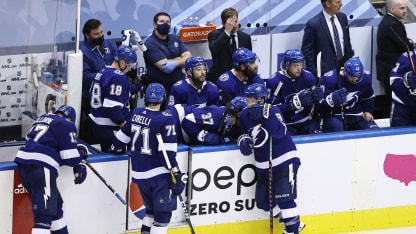As the Tampa Bay Lightning coaching staff walked from the bench to their room inside Toronto's Scotiabank Arena during the Bolts' epic quintuple overtime victory over the Columbus Blue Jackets in Game 1, they passed each time by the coaches room for the Boston Bruins, who were scheduled to start their series with the Carolina Hurricanes later that evening.
Inside the Lightning locker room during the Game 1 5OT classic
It was the responsibility of Mark Lambert and the support staff to do whatever they can to keep the Bolts' performance up through intermissions

© Getty Images


















